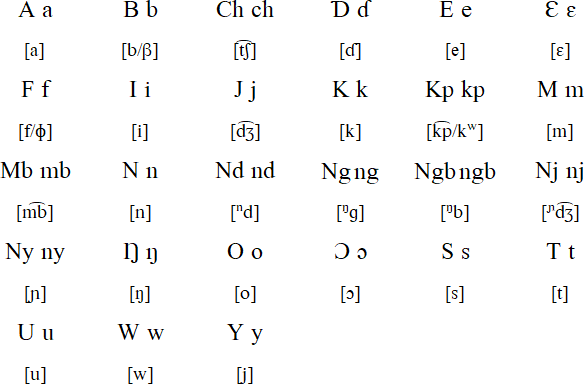Oroko is a Bantu language spoken by about 110,000 people in southern Cameroon, particularly in the Meme and Ndian divisions of the Southwest Region, and also in Kribi in ths South Region. Oroko is used by people of all ages, however children and young people are more likely to use Cameroon Pidgin, as that is the language of instruction in school, and many feel ashamed of their own language.
Oroko is also known as Balondo, Bakundu-Balue or Balundu-Bima. Dialects include Lokoko, Lokundu, Londo, Lolue, Lotanga, Bima, Ekombe, Mbonge and Longolo. They are more or less mutually intelligible.
Oroko can be written with the Latin alphabet. There are several different spelling systems. Oroko people are happy that their language is being written and taught in schools, however they do not wish it to slow their childrens' progess in English, which is perceived as the language of economic advancement and progress.

Some versions of the Oroko alphabet use d, while others use ɗ.
Download an alphabet chart for Oroko (Excel)
Ngɔ e laka mboli. One momana fɛ a lu ngɔ. A mo lua dikɛlɛ. A mo lua mboli. Nga a ma bula nina o maliba, e buleli ea a maliba ama “How?” Nga mɔ a mati dikɛlɛ or nga anji ngɔ a tombani monɛ ŋili maliba onɛ, mboli eni e ko da dikɛlɛ dini, kwɔta-kwɔta.
Everyone knows that leopards eat goats. Once there was a man who had a leopard, a plantain stalk and a goat. When he reached a stream, he wondered how he would cross. If he left the plantains and took the leopard across, the goat would eat the plantains and he would not have any plantains left.
Source: Oroko orthography development: Linguistic and sociolinguistic factors by Dan T. Friesen.
Information about Oroko
https://en.wikipedia.org/wiki/Oroko_language
http://abcwaoroko.blogspot.com/p/abc-chart.html
https://commons.und.edu/theses/4481/
https://www.ethnologue.com/language/bdu/
https://orokousa.org/danlisa-oroko-dialect/
Aka, Bafaw-Balong, Bangi, Basaa, Bemba, Bembe, Bena, Benga, Bhaca, Bube, Bukusu, Bulu, Central Teke, Chichewa, Chokwe, Chuwabu, Comorian, Dciriku, Digo, Duala, Eton, Ewondo, Fang, Ganda/Luganda, Gogo, Gusii, Gwere, Haya, Hehe, Herero, Ibinda, Ikizu, Ikoma, Jita, Kabwa, Kako, Kamba, Kiga, Kikuyu, Kimbundu, Kinyarwanda, Kirundi, Kisi, Kogo, Komo, Kongo, Konjo, Koti, Kukuya, Kunda, Kuria, Kwambi, Lambya, Lingala, Loma, Lozi, Luba-Katanga, Luchazi, Lunda, Luvale, Luyana, Makaa, Makonde, Makhuwa, Mandekan, Maore, Masaaba, Mbama, Mbere, Mbukushu, Mbunda, Mbuun, Mende, Mongo, Mpiemo, Mushungulu, Mwani, Nambya, Nande, Ngoni, Nkore, North Teke, Northern Ndebele (South Africa), Northern Ndebele (Zimbabwe), Northern Sotho, Nyamwezi, Nyakyusa, Nyemba, Nyole, Nyoro, Nyungwe, Nzadi, Oroko, OshiWambo, Pagibete, Punu, Ronga, Safwa, Sena, Sengele, Shona, Soga, Songe, Southern Ndebele, Southern Sotho, Sukuma, Swahili, Swati, Tanga, Tembo, Tonga, Tooro, Tshiluba, Tsonga, Tswa, Tswana, Tumbuka, Umbundu, Venda, Vili, Vwanji, Xhosa, Yakam, Yansi, Yao, Yasa, Yeyi, Zigula, Zinza, Zulu
Languages written with the Latin alphabet
Page created: 02.08.23. Last modified: 04.08.23
[top]
You can support this site by Buying Me A Coffee, and if you like what you see on this page, you can use the buttons below to share it with people you know.

If you like this site and find it useful, you can support it by making a donation via PayPal or Patreon, or by contributing in other ways. Omniglot is how I make my living.
Note: all links on this site to Amazon.com, Amazon.co.uk
and Amazon.fr
are affiliate links. This means I earn a commission if you click on any of them and buy something. So by clicking on these links you can help to support this site.
[top]